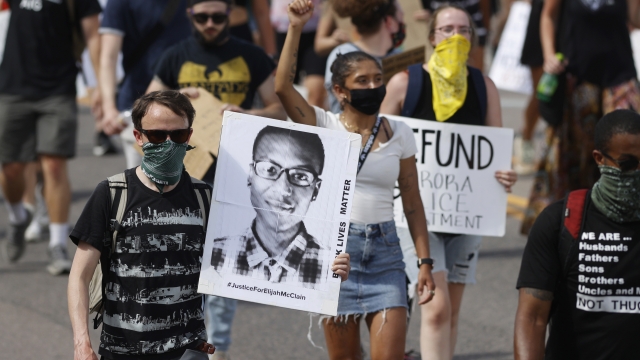The criminal trial for two of three police officers charged in the death of Elijah McClain begins this week, more than four years after McClain died in Aurora, Colorado.
McClain, a 23-year-old Black man, died in August 2019 following a rough altercation with police and an injection of the sedative ketamine, administered by paramedics.
The incident led to a $15 million settlement with McClain's family, the largest wrongful death lawsuit settlement in the history of Aurora. Following the incident, Colorado's attorney general also announced there was a pattern and practice of racially biased policing, and that the fire department had a pattern of administering ketamine "in violation of the law."
This led the city to agree to multiple reforms as part of a consent decree with the attorney general's office.
The charges
Randy Roedema and Jason Rosenblatt both pleaded not guilty to criminally negligent homicide, manslaughter and second-degree assault charges in connection with McClain's death.
A third officer, Nathan Woodyard, will face a jury at a later date. He pleaded not guilty to negligent homicide and manslaughter charges.
Two paramedics, Peter Cichuniec and Jeremy Cooper, also pleaded not guilty to similar charges and will have a trial later this year.
Internal recordings
In internal video recordings obtained by Scripps News, Roedema told homicide investigators the officers initially approached McClain in 2019 because they were dispatched to a "suspicious male walking down the street."
McClain, who was not committing any crime, was wearing a black face mask as he walked home from a local convenience store.
The incident happened months before the COVID-19 pandemic hit Colorado and people were regularly wearing masks.
Someone called 911 to report that McClain looked "sketchy."
"(McClain) was wearing a ski mask, and he kept stating, 'I'm an introvert. I'm an introvert. I'm not a normal person,'" Roedema said in a video-recorded interview with homicide detectives from Denver Police Department and Aurora Police Department.
Rosenblatt told investigators he tried to "de-escalate" McClain when he first approached with the other officers.
"I could feel his arms tensing up," he told homicide detectives during an interrogation hours after the encounter. "I was trying to pull them away from his body. I was like, 'Hey dude, you know, what's going on?' And we're trying to kind of like talk to him, kind of like de-escalate him. I try to talk to people, you know?" he said.
Rosenblatt said he eventually made eye contact with officer Woodyard and decided to move McClain away from a bed of rocks onto a grassy area as the three officers forced McClain to the ground.
SEE MORE: Trial begins for two police officers charged in Elijah McClain's death
"I think he was pulling the whole way. He was really strong," Rosenblatt said of McClain, who weighed 140 pounds.
Rosenblatt said he heard someone say that McClain had reached for someone's gun.
Though McClain cannot be seen grabbing any weapon on the officers' body camera footage, Roseblatt said he felt the situation escalating after he heard those words. "The way we're taught, if someone is going to be doing things like that, they have nothing to lose."
Roedema said he physically pulled McClain into a folded position.
"I immediately grabbed the individual by the head with both hands and pulled him down to the ground so that he was bent over. He fell to the ground," said Roedema.
Rosenblatt and Woodyard said they attempted a carotid control hold, a restraint technique that restricts blood flow to the brain.
The move has since been banned in Colorado.
Rosenblatt said he released his hold when he knew he was not in an "effective" position.
Woodyard said he applied pressure to the sides of McClain's neck.
"I moved my right hand in, put it against my bicep like this, took my other hand and put it against my head with my palm facing me and began to apply pressure to the sides of his neck. I felt that I had good positioning, my elbow in the middle of his chest," he told detectives. "While I was doing this, I was communicating with Officer Roedema and Officer Rosenblatt, and I was asking them, 'Is he conscious? Is he going out?'"
Later, paramedics who arrived on the scene decided to administer ketamine, a powerful sedative.
An amended autopsy found McClain died of "complications of ketamine administration following forcible restraint."
According to Jon Sarche, a public information officer for the Colorado Judicial Department, the opening statements in the trial for Rosenblatt and Roedema are expected to begin Wednesday, and the trial is scheduled through Oct. 13.
Trending stories at Scrippsnews.com



